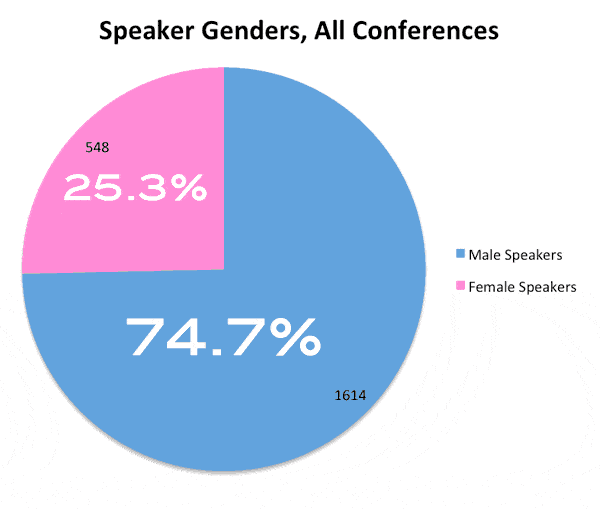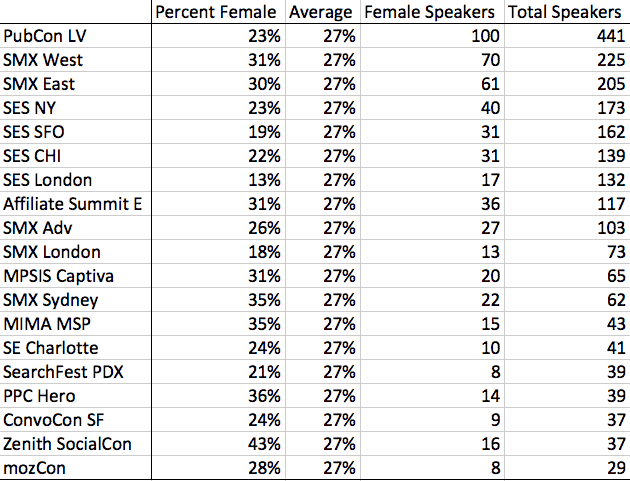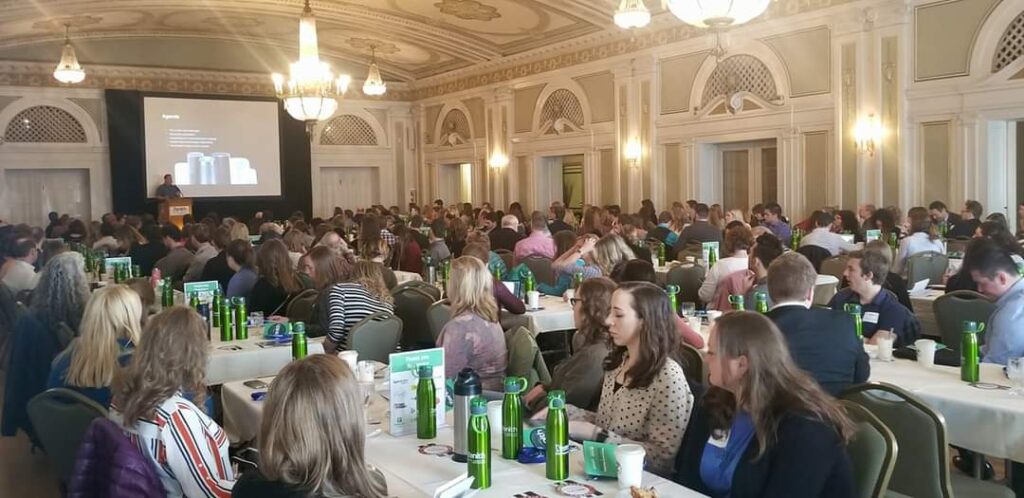In the following graph, conferences are ordered by total count of speakers:
So, now you have the data. Let’s find out what our evangelists think.

Mari Smith:Â It really is all about who you know, and who knows you. I often have conference organizers ask me who I know with certain subject matter expertise. The more that women speakers get out there and speak, the more they’ll build their presence and increase their speaking invitations. See #3 for ideas!


Second, it’s easy for conferences to select the same speakers year over year. Take a look at the speaking agenda at a conference this year over last. My guess is the speaker list is very similar. Conferences may take offense to that, but I’ve liveblogged hundreds, if not thousands, of conference sessions over the years and I can tell you that the faces are the same. It actually became difficult to continue liveblogging because it was the same people year over year.
Third, and I’m not sure of the reason for this, but women speakers actually score lower than male speakers by the audience. Even women who I have heard speak many times and know how incredible they are on stage. As a woman, when you hear that, it can be disheartening and make you feel like that “boys club” mentality is still in effect, despite how progressive our industry truly is. I don’t know why women score lower. It certainly doesn’t feel deserving. But I know that it happens and have seen data that proves it.
Fourth – and I’ll go there – sometimes attending conferences as a woman is difficult. Hearing Jane Copland’s story was not surprising to me. I personally suffered a very threatening situation a few years back – which has limited my conference attendance, as well as my visibility at the conferences when I do attend.  I love the people in our industry so this is difficult to say but – I don’t always feel comfortable in the environment, especially if I know I would have to attend alone.

I am really sensitive to this issue because we have worked so hard to be inclusive of women at our conferences. I remember ten years ago, when we had the “women of search” panels that consisted of the 4 same women at every conference. We finally quit having them because we couldn’t find any new women to be on the panels.
Today, things are light years ahead of the way they used to be. The knowledge, depth, and presence of some of the women today is awe inspiring – if not a little intimidating. I heard AOL Director of Search Melanie Mitchell talk about running her team at AOL and what SEO tools they used in about 2008. It was a fascinating and inspiring talk. I realized that she’d already surpassed about 99% of the men in the industry with her mastery of the subject.
The women that are speakers today are some of the best speakers we have. Women such as Krista Neher, Lisa Buyer, Joanna Lord, Rhea Drysdale, Alex Bennert, and Reem Abeidoh are often at the top or near the top of the speaker ratings. I think it is also cool to note that some of the best conference content programmers have been women. The formational years of AdTech were built by the incredible content programmer Susan Bratton. Affiliate Summit’s is in part by Missy Ward – And we have yet to mention the mega-powerhouse BlogHer.
I think if we could look at male speaker to male attendee, and the same female speaker to female attendee ratios, you would be surprised at the numbers. Speaking for Pubcon, we clearly have a much higher ratio of women speakers to women attendees than male speakers to male attendees.



Because there are fewer women in leadership roles at companies, fewer are invited or accepted to speak at conferences. Some speaking gigs are quid pro quo for sponsorship dollars, so the sponsoring companies send their male executives—they may not even have (m)any female executives.
Women also generally make less money than men do and most conferences only offer compensation or cover travel costs for keynote speakers. Costs for travel, plus the opportunity costs of being away from the office, can be substantial. Since women are usually the primary caregivers in their families, moms may have additional costs and hassles to contend with. Spending hundreds or thousands of dollars to work for free—albeit with the benefit of better visibility—may not pencil out for a lot of women.

Also, over the years, many of the male industry leaders have built up a portfolio of successful speaking engagements to point to when pitching. A lot of speaking gigs in this industry are booked on word of mouth referrals, or previous year’s performances. Many men get asked to speak simply because they’ve done it before and it went well. This is a momentum that has kept the gender ratio skewed for a number of years.
Another reason, albeit one that is changing, is many conferences prefer to have C-level executives taking the stage. While we’ve made huge leaps here, there simply aren’t as many women in leadership positions as men, and therefore you see a bias in the agenda from that.
I guess what I am saying is, there are a lot of reasons why women are underrepresented as speakers at conferences. None of which, in my opinion, are impossible to overcome in the upcoming years.

Read on for the second discussion question and full responses from our panelists.














